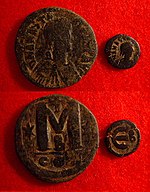Our website is made possible by displaying online advertisements to our visitors.
Please consider supporting us by disabling your ad blocker.
Nummus

Nummus (pl. nummi) is a Latin word for various coins that was borrowed from Doric Greek noummos (νοῦμμος; Classical Greek: νόμος, nómos).[1][2] Originally referring to a specific style of coin used in Greek-speaking Southern Italy, the term nummus came to be used by the Late Republic for all coins generally and particularly as a synonym for the sestertius, then the standard unit of Roman accounting, and then in Late Antiquity as the formal name of the follis. It was used in this general sense in Early Modern English[3] but is most commonly employed by modern numismatists as a catchall term for various low-value copper coins issued by the Roman and Byzantine empires during Late Antiquity.[4]
Forms of the term nummus also appear in various scientific names and in medical jargon for coin-shaped species, structures, and disorders.
- ^ νοῦμμος, νόμος. Liddell, Henry George; Scott, Robert; A Greek–English Lexicon at the Perseus Project.
- ^ Klose, Dietrich (Munich). "Nummus." Brill's New Pauly. Antiquity volumes edited by: Hubert Cancik and Helmuth Schneider. Brill Online, 2015. Retrieved 02 June 2015
- ^ Cf. Camden's Britannia et al.
- ^ Moretti, Federico (1828). Diccionario militar español-francés. Imprenta Real de Orden Superior. p. 116.
Previous Page Next Page


